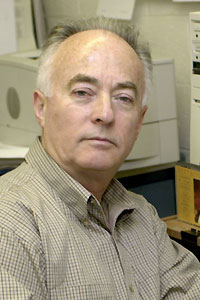For more archives, go to the Advance Archive/Search Page.
Two Engineering Faculty Named
To Endowed Positions
The School of Engineering has named Yaakov Bar-Shalom as the Marianne E. Klewin Professor in Engineering, and Thomas K. Wood as the Northeast Utilities Chair in Environmental Engineering Education
Endowed chairs and named professorships are among the most prestigious and coveted honors for academics. They raise the University’s stature, help in recruiting and retaining world-renowned faculty, enhance funding opportunities, and elevate the reputation of the funding organization.
Since 1998, the School of Engineering has secured external funding for endowments to support 17 chairs and named professorships.
“The School of Engineering is very fortunate to have the support of industrial friends and alumni that allows us to establish these endowed faculty positions,” says Amir Faghri, dean of engineering. “They bring prestige and recognition to the University, while honoring – and helping us to retain – world-class faculty who enjoy international stature.”
 |
|
Yaakov Bar-Shalom |
|
File Photo
|
The Marianne E. Klewin Professorship, to which Bar-Shalom was named, was established with an endowment donated by alumnus Charles R. Klewin (B.S. ’71, M.S. ’74, civil engineering). Klewin has actively supported the School of Engineering through investments in education and teaching, including funding for the C.R. Klewin Civil Engineering Excellence in Teaching Award.
Bar-Shalom, a Board of Trustees Distinguished Professor of Electrical & Computer Engineering, is a world-renowned authority in target tracking, detection, estimation and data fusion, and many aspects of random systems theory and its applications. He is widely recognized as a premier researcher in the area of multisensor/multitarget tracking. His work involves development of computer algorithms that keep track of objects, such as airplanes. It is already being used in Boston by Logan Airport’s ground traffic monitoring system, by the Navy, and in Israeli and U.S. missile defense systems. His algorithms also drive an Australian radar system that keeps track of all sea and air traffic within a 2,500-mile radius.
Bar-Shalom received his Ph.D. in electrical engineering from Princeton University in 1970 and worked as a research scientist and engineer for Systems Control Inc. in California before joining the University of Connecticut in 1976.
He has published prolifically in the field of target tracking, authoring more than 130 peer-reviewed journal papers and four books, and is a former associate editor of IEEE Transactions on Automatic Control and Automatica. He is a frequent keynote speaker at major conferences in his field. Bar-Shalom is a Fellow of the Institute of Electrical and Electronics Engineers (IEEE), and received the IEEE Control Systems Society Distinguished Member Award in 1987. He served as president of the International Society of Information Fusion in 2000 and 2002.
The Northeast Utilities Chair in Environmental Engineering Education was established with an endowment donated by Northeast Utilities, which has been a consistent supporter of the School of Engineering during the past six years and previously funded the Northeast Utilities Foundation Chair Professor of Environmental Engineering.
 |
|
Thomas K. Wood |
|
File Photo
|
The newly-named incumbent, Wood, is a professor of chemical engineering with a dual appointment in molecular and cell biology. He received his Ph.D. from North Carolina State University in 1991 and embarked on his academic career at the University of California, Irvine, before joining the UConn faculty as an associate professor in 1998. Early in his career, Wood also worked briefly with Rohm and Haas Co. in Bristol, Pa, and Becton Dickinson and Co. of Research Triangle Park, N.C.
An expert in phytoremediation, Wood is interested in various applications, from using bacteria to remove environmental pollutants from soil, to modifying natural biofilms to inhibit corrosion. One of his long-term research projects involves the genetic engineering of bacteria to remediate such toxic solvents as tetrachloroethylene (PCE), a compound used in dry cleaning and manufacturing operations across the globe. PCE is among the potentially most toxic of pollutants found in municipal groundwater. Wood and his research team are manipulating the metabolism of a bacterium so that it effectively breaks down PCE and other dangerous solvents aerobically.
Wood has received many awards, including the Outstanding Junior Faculty Award, School of Engineering (2000); the Rogers Outstanding Teaching Award in Chemical Engineering at UConn (2000); and the U.S. Army Research Office Young Investigator Award (1992). He has published more than 70 peer-reviewed journal articles. He is on the editorial board of Applied and Environmental Engineering and has one U.S. patent.

